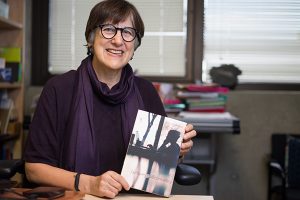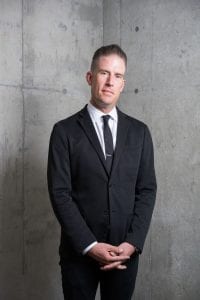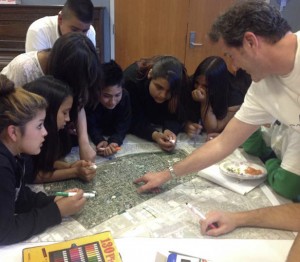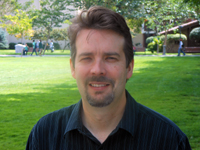
Photo: James Tensuan
Dr. Jan English-Lueck will be featured in a three-part documentary on Discovery’s Science Channel in March as an expert on Silicon Valley culture.
By David Goll
A San Jose State University professor considered one of the leading experts on the unique culture of Silicon Valley will be prominently featured when the small screen takes a close look at the world’s birthplace of high tech.
Dr. Jan English-Lueck, a professor of anthropology at SJSU since 1991, is part of “Silicon Valley: The Untold Story”, a three-part documentary series premiering March 19 on Discovery’s Science Channel. Produced by Michael Schwartz for Menlo Park-based Kikim Media, the series will examine how the agricultural region once world famous for vast reaches of fruit orchards — known as the “Valley of Heart’s Delight” — became fertile territory for technological innovations and sprouted such household-name corporations as Intel, Apple, Google and Facebook.
English-Lueck is among the Valley’s Who’s Who of interviewees for the program, including Apple co-founder Steve Wozniak, venture capitalist and entrepreneur Heidi Roizen, entrepreneur and tech executive Kim Polese, journalists John Markoff and Michael Malone, and high-tech historians Leslie Berlin of Stanford University and Margaret O’Mara of the University of Washington.
History plays a big part in the program, as the series will sift through 150 years of the region’s history.
The program’s debut comes just a few months after English-Lueck’s second edition of her famed book about the region, “Cultures@SiliconValley, was published last summer. Her 2,000 hours of research included spending a year with local families to assess the impacts of the industry and its products on local life. The book’s first edition appeared in 2002.
English-Lueck’s participation in the television project dates to 2014, when she underwent three hours of interviews at the Computer History Museum in Mountain View. Afterwards, she heard nothing more about the program until December, when she received an invitation to attend the series’ premiere at the museum in January.
“I sort of forgot about it,” she said with a laugh during a recent interview. “It was a surprise to get the invitation. I’m one of the talking heads.”
English-Lueck, who spent several years as associate dean of the College of Social Science before returning to teaching in 2014, was hired 27 years ago to delve into and explore Silicon Valley as a cultural phenomenon. She has become a popular interpreter of the region’s social fabric and its powerful societal impacts.
“I get calls from throughout the world, including recently from the BBC,” she said. “Silicon Valley has developed its own cultural identity over the years. It has its own way of life and exported it to the entire world.”
English-Lueck, also a fellow at the Institute of the Future, a Palo Alto-based nonprofit research organization, said Europeans especially are both fascinated and repulsed by Silicon Valley.
“They find it distasteful people here can’t compartmentalize their lives, they’re always connected to technology and every social interaction is viewed as a way to get ahead professionally and socially,” she said.
Dr. Roberto Gonzalez, chair of the Department of Anthropology said he was thrilled to hear of his colleague’s involvement in the series and “delighted, but not surprised” about her book’s second edition.
“It has become a modern classic in the field of anthropology,” he said. “Very few ethnographies have such lasting relevance or maintain such interest.”
Gonzalez said English-Lueck’s expertise is renowned.
“Jan is among a small handful of social scientists who have gained keen insights into the workings of Silicon Valley’s diverse cultures, not just the ‘tech culture’ of engineers and programmers, but the cultures of immigrants, working people and families,” he said.
He described SJSU’s relationship with Silicon Valley as “complicated.”
“On one hand, SJSU students who want to work for the industry often have great success in finding positions with companies like Google, Facebook, Adobe and the rest,” he said.
But, he said the tech industry has been justifiably criticized for its lack of diversity.
“The vast majority of top positions are filled by graduates from Ivy League schools or Stanford, not San Jose State and other public universities,” he said.



